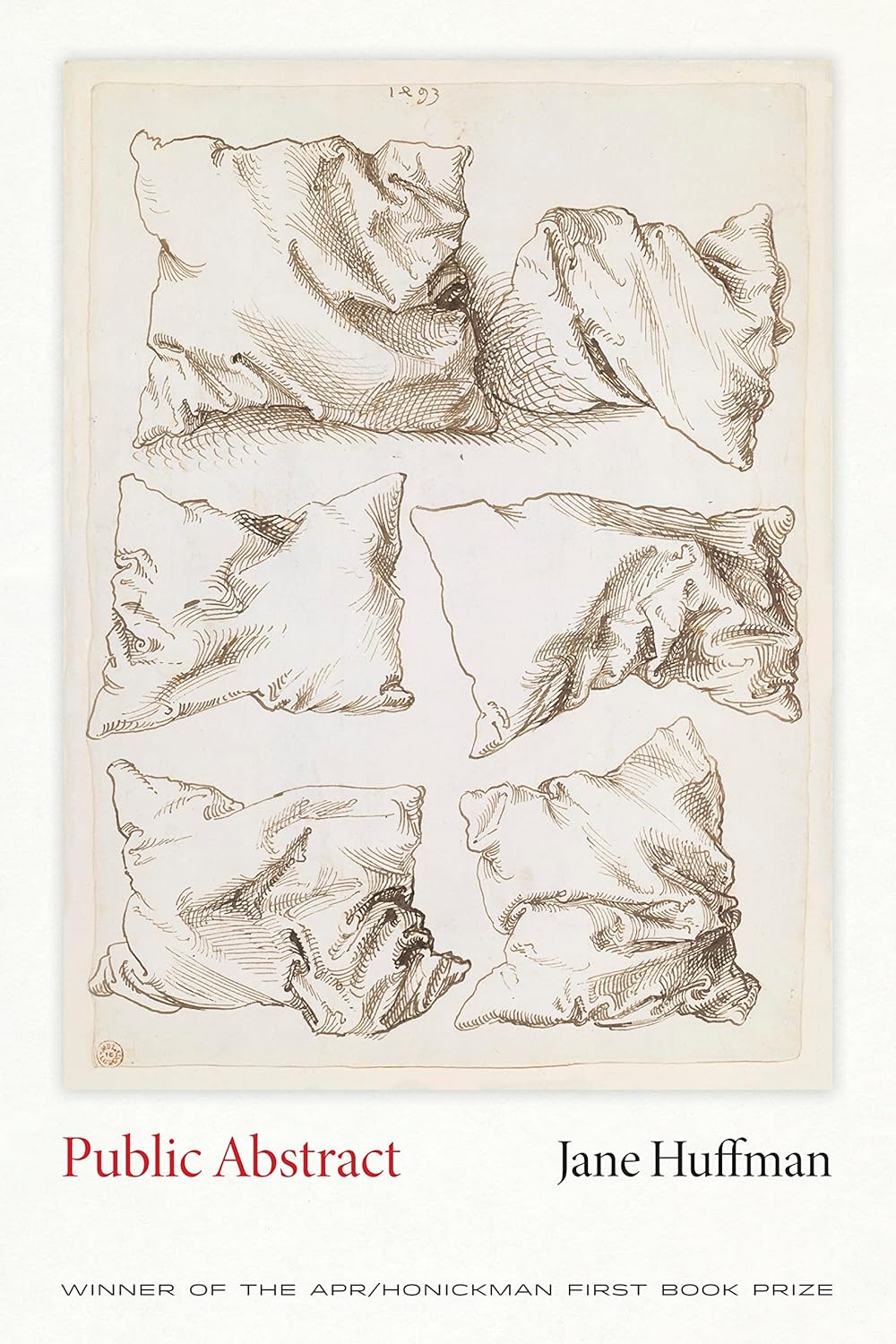Jane Huffman
The American Poetry Review ($16)
by Erick Verran
Like a Purcell aria, Jane Huffman’s poetry is plaintive, formally numb, and indefatigably self-pitying. Early in Public Abstract, Huffman introduces “my brother death,” the Thanatos to her Hypnos: “Held the broom / Of sleep // Between / My teeth // Until I slept,” she mutters (and readers might note the cover art, Albrecht Dürer’s Pillow Studies). Recalling the ill lungs with which it begins, this debut collection is by turns caught up short in shallow brushstrokes and morbidly expansive:
I am under-interpreting my symptoms, the doctor says. My interpretation can no longer be trusted. I’m seated in a glass spirometry machine. On one monitor, green lines tick against a dark backdrop. On another, a cursor draws roulettes. It will feel like you’re breathing with your mouth against a brick wall, the doctor says. Air buckles behind my lips. So in love with interpretation, I’m blue in the face from kissing it.
Though koans abound—a goldfish pond, for instance, “Is mostly water / Little gold in it at all / Despite its name”—haibun, which combines narrative prose with haiku, is the main attraction. Haibun was invented in the late 1700s by Bashō during a months-long journey through the Japanese hinterland, as recounted in his travelogue The Narrow Road to the Deep North. Huffman, trapped somewhere between agoraphobia (“with the curl / of my ear to the door”) and invalidism (“Mortified to move / My body through // The world // In the way / That it demands”), keeps to the country of her emotional interior, sketching poems that would fit onto envelope paper.
Like Emily Dickinson, who is echoed here, Huffman is neither straightforward nor deliberately cryptic, but rather mysteriously honest. Dickinson, though, for all her proto-modernity, was never this recursive (“I was / small and dizzying. I was dizzy. I rode / in small and dizzying circles”—here she sounds more like Robert Creeley or John Taggart). Huffman’s wish to thank literally everyone in the book’s end pages—university administrators, a twelfth-century troubadour, the family dogs—is perhaps unconsciously snobbish, while in her more maximalist mode she can slip into scholastic preoccupation, as prose experimenters are wont to do:
In the first translation is a hammering. “Should”—a moral judgment. An oiled object laid bare on a linen bed. “Shouldn’t” tied around the “should” with butcher’s string.
In the second, a yip, a certainty, desperate in its forwardness. “Where could?” as if the possible eluded him. To boot, denied its final mark. The thought falling from “Where could?” like rain from a cloud, a vanishing source.
This has all the verve of a dissertation. The more finished poems, labeled revisions or fragments, are the more successful; and when a “failed” sestina abruptly breaks off, like the fugue Bach died writing, the reader lurches after its absence.
Evincing stylistic kinship with Language poets such as Rae Armantrout, Huffman’s instruction, though cold as doctrine, consistently fascinates for its willingness to teeter at the edge of sense; we find her weeping “into the zenith of a rose,” a kiln is said to be “thinking itself warm.” This is impressive, given that the book ultimately concerns the rippling effects of her sibling’s addiction (much like Natalie Diaz’s When My Brother Was an Aztec). In the penultimate section, Huffman’s topical absorption reveals itself to be deceptively extempore. One paragraph hides a sad vocabulary drawn from pregnancy, including tied fallopian tubes, the question of viability, and a metal pail. Another rhymes with drowsy lethargy:
I wrote a play, out cold in urgent care. Heated blankets toweling my sweated hair. When staged, the actress playing Mother held a wicker broom for acts two and three, with which she beat and beat the rug—a heavy tapestry rolled across the deck. It jumped with fleas—a cast of tiny specks that leapt with urgent hunger as she swept. Lucidly, I slept. I always do, when in duress (no escape from the world of the page). So I wondered how I would create the effect on stage — what props and practical effects—and who would clean up the mess?
With their diminutive, hardened fragility, there is something a bit Glass Menagerie about Huffman’s poems; and though Public Abstract also feels cobbled together, it coheres with greater sureness than many first collections of poetry. To avoid the pitfalls of the merely cerebral—intelligence for the hell of it—there’s no denying that the live wire of a poem must be grounded in the truth. But truth, with apologies to Keats (and to Huffman, who quotes from “Ode on a Grecian Urn”), isn’t beauty ipso facto. Without invention, the unadorned horror of what happened, like one might overhear in a waiting room, will be “private as a runny nose” and as interesting. What so often disappoints about artistic suffering is its obviousness, the way it leans on grief at half the craft. Huffman, however, allows hurt to knock everywhere, to come out with things plainly, in this enviably wise debut. The language countermands—“The lie is that today I want to die”—and this gives life its shape.
Click below to purchase this book through Bookshop and support your local independent bookstore:
Rain Taxi Online Edition Spring 2024 | © Rain Taxi, Inc. 2024

